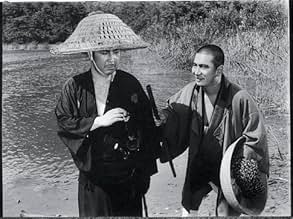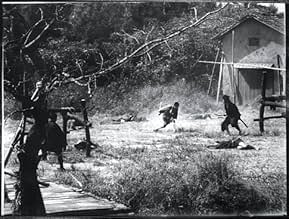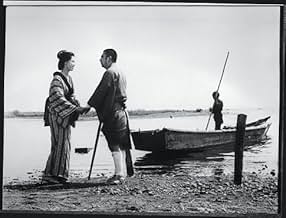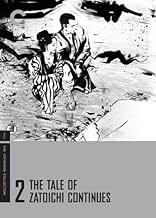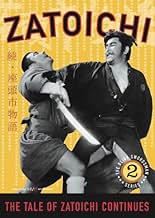AVALIAÇÃO DA IMDb
7,2/10
3 mil
SUA AVALIAÇÃO
Adicionar um enredo no seu idiomaThe blind masseur and swordsman, Zatoichi, learns of a powerful political figure's secret and is quickly tailed by a group of killers.The blind masseur and swordsman, Zatoichi, learns of a powerful political figure's secret and is quickly tailed by a group of killers.The blind masseur and swordsman, Zatoichi, learns of a powerful political figure's secret and is quickly tailed by a group of killers.
- Direção
- Roteiristas
- Artistas
Yaeko Mizutani
- Setsu
- (as Yoshie Mizutani)
Tomisaburô Wakayama
- Nagisa no Yoshiro
- (as Jô Kenzaburô)
- Direção
- Roteiristas
- Elenco e equipe completos
- Produção, bilheteria e muito mais no IMDbPro
Avaliações em destaque
Seen on YouTube in black and white and, checking on
IMDb, it is in black and white. Beautiful music as usual, captivating story as usual, good acting and, especially, notable female beauties such as Masayo Banri and Yaeko Mizutani, two very beautiful Japanese women. Mixture inspired by drama and action, worth seeing.
The following review is an extract from the book "Shintaro Katsu´s Zatoichi: Complete guide to all movies", which is now available on Amazon.
Zatoichi (Shintaro Katsu), the famous and prodigious masseur and blind swordsman, has arrived in a new region after the adventures narrated in the first film. After confronting some arrogant soldiers, who throw him into the water when they discover him in the boat in which they were crossing a river, he is hired to massage the head of a samurai detachment. However, while he is doing this work, he indiscreetly discovers a secret of the lord ("I had never had a client like this one..."), so the samurai will persecute him with the intention of killing him.
(...)
Second part of a long line of films with the mythical blind masseur, hardened player and wandering swordsman Zatoichi as the protagonist. The actor who gives life to the character is, once again, the great Shintaro Katsu. The director of this second part is not Kenji Misumi, but another director (Kazuo Mori). The sequel to "Zatoichi monogatari" (shot the same year, 1962) is not at the same level as the original. There are some gaps in the story; for example, it is never quite clear why the samurai want to kill Zatoichi (What is the secret that the masseur has discovered about the lord? It must be such a big secret that not even the spectator has the right to know...
In any case, Zoku Zatôichi monogatari's viewing is a good opportunity to see Shintaro Katsu and Tomisaburo Wakayama (Zatoichi and Yoshiro, repectively), two greats of the sixties and seventies chambara, who were also brothers in real life.
Zatoichi (Shintaro Katsu), the famous and prodigious masseur and blind swordsman, has arrived in a new region after the adventures narrated in the first film. After confronting some arrogant soldiers, who throw him into the water when they discover him in the boat in which they were crossing a river, he is hired to massage the head of a samurai detachment. However, while he is doing this work, he indiscreetly discovers a secret of the lord ("I had never had a client like this one..."), so the samurai will persecute him with the intention of killing him.
(...)
Second part of a long line of films with the mythical blind masseur, hardened player and wandering swordsman Zatoichi as the protagonist. The actor who gives life to the character is, once again, the great Shintaro Katsu. The director of this second part is not Kenji Misumi, but another director (Kazuo Mori). The sequel to "Zatoichi monogatari" (shot the same year, 1962) is not at the same level as the original. There are some gaps in the story; for example, it is never quite clear why the samurai want to kill Zatoichi (What is the secret that the masseur has discovered about the lord? It must be such a big secret that not even the spectator has the right to know...
In any case, Zoku Zatôichi monogatari's viewing is a good opportunity to see Shintaro Katsu and Tomisaburo Wakayama (Zatoichi and Yoshiro, repectively), two greats of the sixties and seventies chambara, who were also brothers in real life.
Return of Masseur Ichi, The (1962)
*** (out of 4)
Blind masseur Zatoichi (Shintaro Katsu) discovers the weakness of a lord and must fight off various assassins who fear he will give away that secret. This was a pretty interesting samurai film from director Kazuo Mori, which relies a lot on fantasy but most of all is just all action and nice swordplay. Katsu makes for a wonderful lead and the supporting roles are filled nicely. The cinematography stretched out the full 2.35:1 looks incredibly sharp and the fights are well staged even though I have a somewhat hard time seeing a blind person doing all that.
*** (out of 4)
Blind masseur Zatoichi (Shintaro Katsu) discovers the weakness of a lord and must fight off various assassins who fear he will give away that secret. This was a pretty interesting samurai film from director Kazuo Mori, which relies a lot on fantasy but most of all is just all action and nice swordplay. Katsu makes for a wonderful lead and the supporting roles are filled nicely. The cinematography stretched out the full 2.35:1 looks incredibly sharp and the fights are well staged even though I have a somewhat hard time seeing a blind person doing all that.
Roughly a year after his first run-in with the shady Yakuza types of small-town Japan, a notorious blind swordsman blows back into town seeking an encore. Actually, the hopeful pacifist Zatoichi is merely interested in paying his respects at the grave of a fallen comrade, the honorable samurai he out-dueled last time, but the shadier denizens of this corrupt village have long memories and see his visit as an opportunity for revenge.
While that drama plays out, Ichi makes enemies with a misbehaving prince, befriends a trio of prostitutes and crosses paths with another acquaintance: a one-armed former romantic rival who still carries a grudge. The latter is portrayed by Tomisaburo Wakayama, later known for his lead role in the Lone Wolf and Cub films (and star Shintaro Katsu's real-life brother), which makes his eventual duel with Ichi doubly interesting as a sort of unofficial pre-crossover. Not for the last time, either, as 1970 would produce a match between our blind protagonist and Toshirô Mifune's Yojimbo... but that's a topic for another time.
As The Tale Continues is concerned, I found it a mild step down from the first film. There's more action this time, and a much faster pace, but the additional subplots make for a less focused narrative and drain power from the larger developments and reveals of the third act. Another outstanding performance from Katsu, though, and wow, what a final shot!
While that drama plays out, Ichi makes enemies with a misbehaving prince, befriends a trio of prostitutes and crosses paths with another acquaintance: a one-armed former romantic rival who still carries a grudge. The latter is portrayed by Tomisaburo Wakayama, later known for his lead role in the Lone Wolf and Cub films (and star Shintaro Katsu's real-life brother), which makes his eventual duel with Ichi doubly interesting as a sort of unofficial pre-crossover. Not for the last time, either, as 1970 would produce a match between our blind protagonist and Toshirô Mifune's Yojimbo... but that's a topic for another time.
As The Tale Continues is concerned, I found it a mild step down from the first film. There's more action this time, and a much faster pace, but the additional subplots make for a less focused narrative and drain power from the larger developments and reveals of the third act. Another outstanding performance from Katsu, though, and wow, what a final shot!
This movie is, I guess, the first of the very long & very excellent zato-ichi series starring the incomparable Shintaro Katsu who also starred in the shorter but every bit as impressive if quite different series: The Razor. I lived in San Francisco in the 1960s & 1970s & used to go watch these films every week at the Japanese theater in the old "Japan Town". Loved them then, love them now. This film in particular is a classic in every way: cinematographically it looks like Eisenstein - every shot a classic. The compositions, textures & tonalities are breathtakingly beautiful. Dramatically, it's every bit as gripping as Yojimbo or the best Ford westerns (e.g. Stagecoach). And finally the sword-fight choreography - None better. Terrific movie!
Você sabia?
- CuriosidadesThe Tale of Zatoichi proved to be so popular that this sequel went into production the same year, 1962.
- ConexõesFeatured in Best in Action: 1962 (2018)
Principais escolhas
Faça login para avaliar e ver a lista de recomendações personalizadas
- How long is The Tale of Zatoichi Continues?Fornecido pela Alexa
Detalhes
- Data de lançamento
- País de origem
- Idioma
- Também conhecido como
- The Tale of Zatoichi Continues
- Empresa de produção
- Consulte mais créditos da empresa na IMDbPro
- Tempo de duração
- 1 h 12 min(72 min)
- Cor
- Mixagem de som
- Proporção
- 2.35 : 1
Contribua para esta página
Sugerir uma alteração ou adicionar conteúdo ausente

